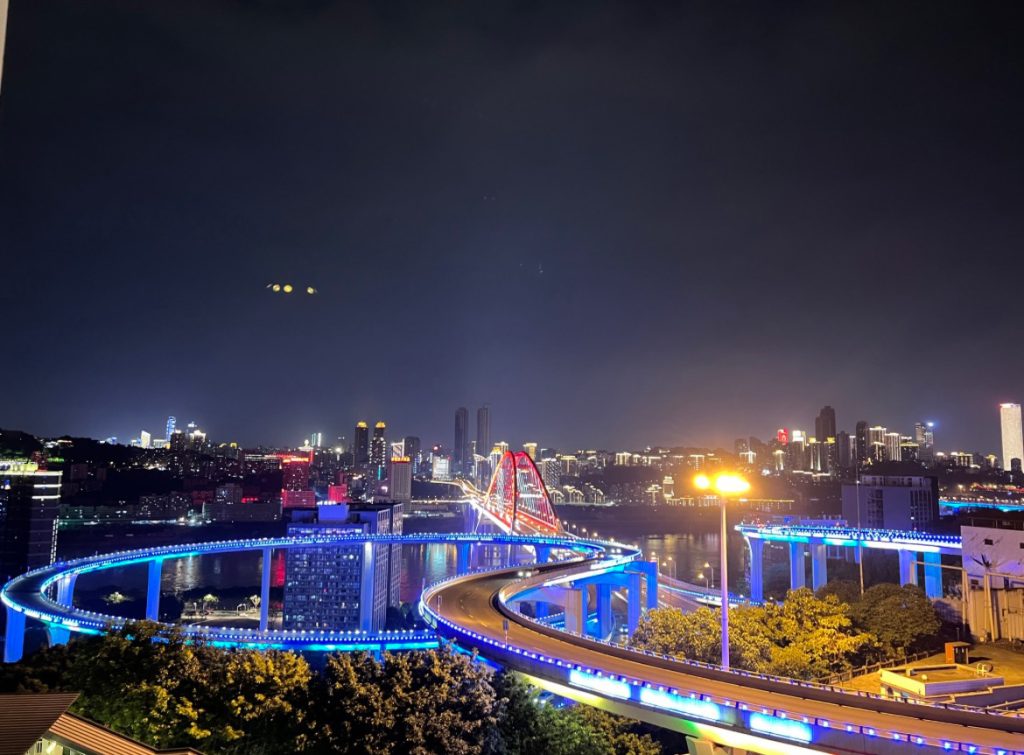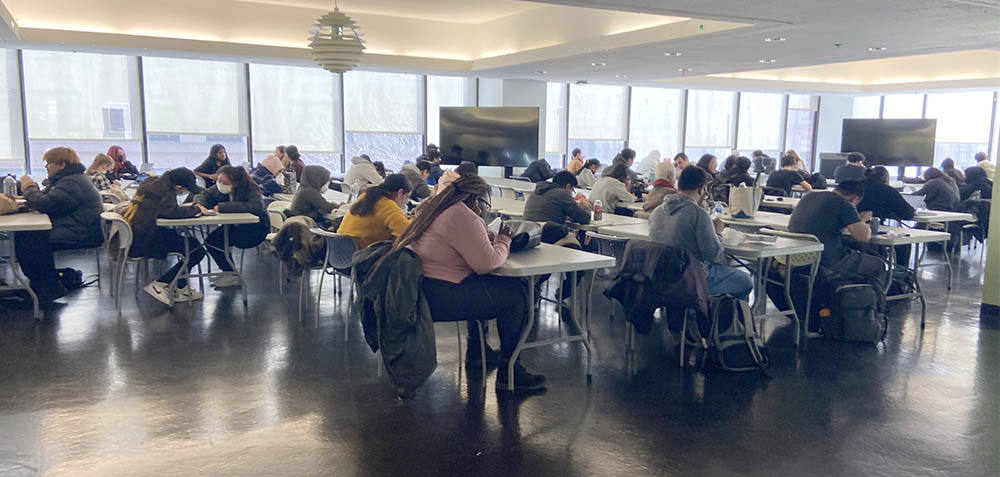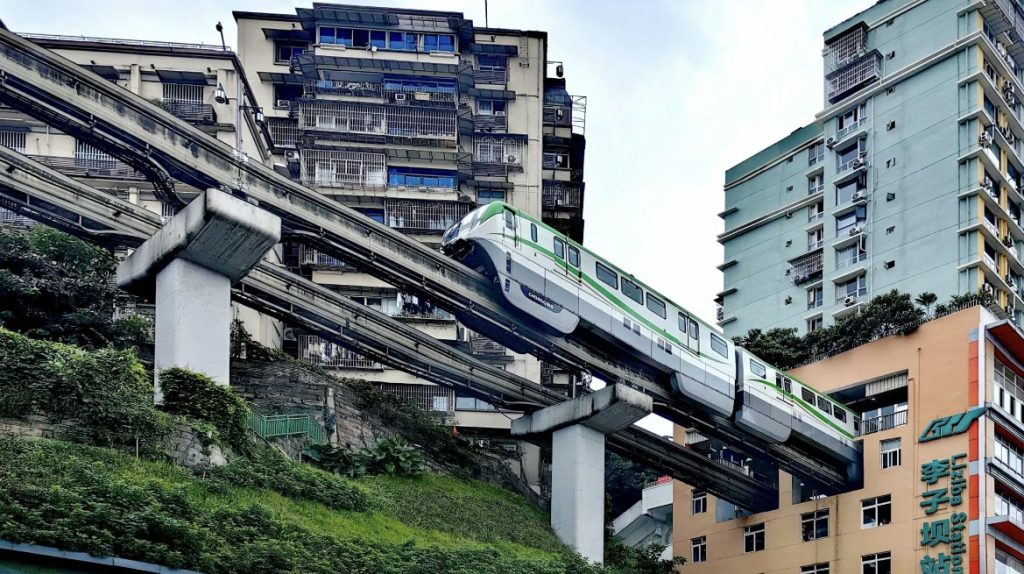This unexpectedly rare occurrence triggered recollections of experiences that WORD writer Xinlan Tang, a political science major with an interest in journalism, was willing to share about a childhood experience in her hometown of Chongqing, China.
Zzz
I was in a deep sleep April 5 when I suddenly felt a strong shaking sensation. Despite my eyes closed and being half-asleep, I realized, subconsciously, it was an earthquake and immediately opened my eyes.
Nevertheless, to confirm this, I observed my surroundings in my room and noticed my cartoon figurines on the bookshelf across from me were rattling but remained upright without falling. Soon after, the glass ceiling window beside my desk started making a continuous creaking sound. It took me about a few seconds from sensing the earthquake to confirming it, and then I shouted, “Mom, Mom.” She was in the next room.
Simultaneously, I heard her calling out to me as well, and we both quickly emerged from our rooms to the living room. As the shaking subsided, we could no longer feel it. Since we live on the second floor of a house in Queens, a relatively low-rise, we didn’t immediately evacuate outside but chose to stay indoors to assess the situation.

XiaoHongShu,Social Media APP
My emotions remained unsettled for a while, and I searched online for related information immediately but couldn’t find any news reports. I felt extremely puzzled but was certain that what we experienced wasn’t a shared illusion between my mother and me.
So, I opened a Chinese social media application, “XiaoHongShu” and searched for earthquake-related posts. I found several IP addresses from people in Manhattan and New Jersey who had posted just seconds ago: “The building was shaking so badly just now! It seems like an earthquake! Did you feel it? It was so scary. This is the first time I felt the building shaking so much!”
Another post, “About 10 seconds I was on the 52nd floor in West Midtown. It was horrible. Earthquake #nyc #earthquakenyc #earthquake.” People also left comments: “I’m on the 22nd floor in Midtown and the bed is shaking.”

At this point, I reopened Google but still couldn’t find any relevant content. My inner unrest grew, and I couldn’t fathom being in one of the most developed and rapidly informed country globally yet unable to find any information about the earthquake within minutes after it occurred – nor did our phones receive any alerts.
Chongqing, When She Was 8 Years old

Picture of Xinlan Tang’s hometown. © Copyright Xinlan Tang
As an international student in the U.S., over the past few years, I’ve seen reports about earthquakes in other states, but they were far from New York City where I stay and attend college at Hunter. I had always felt my city was very safe. However, minutes ago marked the first time in my seven years in the U.S. that I experienced an earthquake in person, which left me deeply shocked and panicked. Another reason for my heightened sensitivity and fear: I experienced a magnitude 8.0 earthquake in my country, China, when I was 8 years old, which was 390 kilometers away from my hometown.
{Earthquake Ratings: 2.5 to 5.4, minor or no damage. 5.5 to 6.0, slight damage to buildings. 6.1 to 6.9: serious damage. 8.0 or greater, massive damage, can destroy communities.}
It was early summer, around 2 o’clock, during a midday self-study session, when my teacher read aloud well-written essays by classmates. I felt a student behind me continuously shaking the desk with her legs, causing my chair to shake vigorously. I turned around and asked her, “Could you please stop shaking?”
After saying that, I turned my head back but within seconds;I felt her shaking my chair again. I turned back and said annoyed, “Don’t try to shake again.” She immediately explained,“I didn’t do anything, you can check my feet.”
As she finished speaking, a booming sound like an army charging forward emanated from the ceiling; it was a deep, powerful, and solid march of a large group of people’s footsteps. Then I saw students and teachers from the upper floors all rush down and run towards the first floor. At that moment, our teacher shouted, “Run, guys!”
Amidst the chaos, I had forgotten how much time it took us to reach the playground. But as if possessing the ability to teleport instantly, all the students of the school were in the playground in a flash, standing scattered yet orderly in their singed class areas. Each child’s face was filled with fear and confusion, not knowing what had happened.
On the broadcast, we heard the principal say “earthquake,” but at 8 years old we could only frown and look up at the teacher, asking, “What is an earthquake?” Teachers were seen anxiously making phone calls, but unfortunately, the network servers were overloaded and didn’t have service. In my memory, every student’s parent had come to pick up their child from school. For those without parents picking them up, the teachers allowed them to go home on their own. I was one of those children with no one coming to pick me up.
Desperate Moments
I ran back home in tears, with no pedestrians on the street and all shops closed. In my mind, I imagined many reasons why my father hadn’t come to pick me up. I wondered if he was still sleeping at home and hadn’t felt the earthquake. Or perhaps he was in danger, having fainted… It wasn’t until I arrived at the front of my building, my home on an 8-floor with no elevator, only stairs, that passing pedestrians urged me not to go up. Despite the risk to my life, I was determined to go up and check if my father was home and trying to save him.
The 8 floors felt incredibly long; each step seemed like two. When I got home, I found my father wasn’t there. I called out for him everywhere, but no one was at home. At that moment, I completely broke down. I ran back downstairs, crying, and quickly escaped the 8th floor, running back to flat ground.
With no one around and unable to contact my father by phone, I felt desperate and walked alone to my grandfather’s workshop. I still worried about my father … I didn’t know where he had gone; I was feeling abandoned and lost.
Half an hour later, I arrived at my grandfather’s workshop and unexpectedly found my father there. I burst into tears and exclaimed, “I’ve been looking everywhere for you! Where have you been?” But my father asked me first. “I went to school but couldn’t find you and I heard from others that many school teachers were leading students to BingJiang Road to avoid the earthquake, so I went there to check if you were with them, but I still couldn’t find you.”
My father said only then did I realize that we just missed each other and I was not abandoned.
For the next two days, we slept at my grandfather’s workshop because the workshop was on the ground level, easy for us to quickly escape in case of an earthquake. During that time, my grandfather’s dog was also there with us. People said dogs can sense aftershocks and will bark, and indeed, the dog barked throughout the entire night. As a result, we were too afraid to fall asleep, but there was no actual danger or aftershocks felt in the end.
A few days later, as I was about to return to school, I thought I could finally get back to normal life. It wasn’t until I turned on the television and saw every channel broadcasting 24-hour live coverage of earthquake news that I truly gained a comprehensive understanding of this earthquake. I realized that those in the earthquake-stricken areas would never be able to return to normal life again.
May 12, 2008, 14:28:04 Beijing Time
The earthquake occurred in Wenchuan on May 12, 2008, at 14:28:04 Beijing time. The epicenter was located in Yingxiu Town, Wenchuan County. The seismic waves of the Wenchuan earthquake were confirmed to have encircled the Earth six times. The earthquake affected most of China and several countries and regions in Asia. In China, areas from Inner Mongolia in the north to Shanghai in the east, Tibet in the west, and Hong Kong and Taiwan in the south all experienced tremors. Countries outside China, such as Thailand, Vietnam, the Philippines, and Japan, also felt the earthquake.
As of September 20, 2008, the Wenchuan earthquake had resulted in 69,227 deaths, 17,923 missing persons, 374,643 people injured to varying degrees, and 19.93 million people displaced. The total affected population reached 46.256 million people. By September 2008, the direct economic losses from the Wenchuan earthquake amounted to 845.14 billion yuan. The Wenchuan earthquake was the most destructive, widespread, and devastating earthquake since the founding of the People’s Republic of China, with the most extensive impact and the greatest difficulty in disaster relief.
This enormous disaster is an indelible memory from my childhood, with daily vigilance over the constantly changing numbers of casualties and rescues reported in the news. Countless families were devastated by this earthquake, plunging all Chinese people into grief. Although 16 years have passed, mentioning the Wenchuan earthquake remains a permanent scar for every Chinese. Also because of this earthquake, all Chinese people are extremely sensitive and highly fearful of earthquakes.
At this moment, news reports about New York earthquakes can already be searched on Google. According to a Reuters New York report, on April 5th, the United States Geological Survey announced that a 4.8 magnitude earthquake occurred near New York City on Friday morning, shaking buildings on the East Coast and surprising residents in this region that rarely experience significant seismic activity. The epicenter was located in Tuckersbury, central New Jersey, approximately 40 miles (64 kilometers) west of New York City.
In Queens, the floor shook so strongly that I felt the building was shaking
I feel that New Yorkers are not sensitive or vigilant about earthquakes. I noticed that posts on my social media about earthquakes were mostly made by my Chinese friends. My friend posted on Facebook “ The first time I experienced an earthquake in New York”. “ It turns out that experiencing earthquakes in a high-rise building is so despairing. Is it so scary and it’s only 4.8? The floor shook so strongly that I felt the building was shaking.

Third-floor student cafeteria. Some Hunter students did feel the latest tremors. Picture by Nyaa Collins.
At that moment, I kept thinking about the possibility of running out from the 11th floor. I opened the door and everyone came out. I can finally empathize with a disaster movie.” Another friend who comes from the same hometown as me said, “The one who experienced the Wenchuan earthquake can tell you that you can’t run away from a big earthquake, and there is no need to run away from a small earthquake. Take it easy!”
When I arrived at college, my American classmates did not discuss anything related to earthquakes. My professor did not even sense the morning earthquake and had never experienced an earthquake before. As New York Governor Kathy Hochul stated in a press conference, “This is one of the largest earthquakes to occur on the East Coast in the last century.”
According to my research, the three states in the United States with the highest earthquake risk are Alaska, California, and Hawaii. Seventy-five percent of earthquakes with a magnitude greater than 5 occur in Alaska.
I express a hope for heightened safety coefficients in contemporary architectural structures to effectively withstand seismic events of high magnitude. Concurrently, increased personal vigilance and awareness of self-preservation and earthquake prevention. As an international student, personal safety and geographical security are always of paramount importance. I am fortunate to live in New York City, a city known for its safety.

Chongqing Train. © copyright Xinlan Tang.
Xinlan Tang can be reached at XINLAN.TANG78@myhunter.cuny.edu

